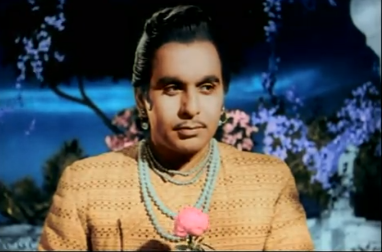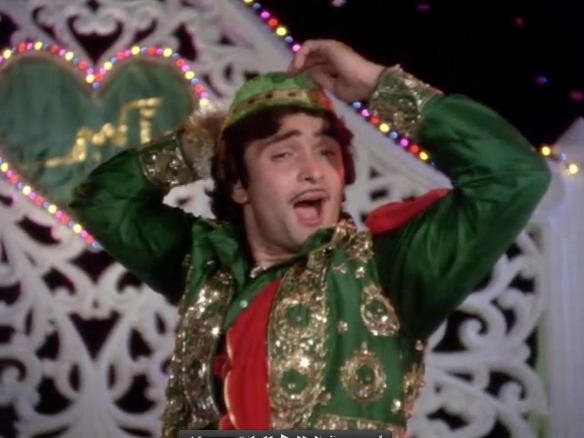
The mehfil for the qawwali looks particularly vibrant in the recolored version of Mughal-e-Azam (1960)
Directed by K. Asif, Mughal-e-Azam (1962) is one of the most cherished films in the history of Bollywood cinema. Although several films have been made around the same premise, Mughal-e-Azam is by far the most well-known depiction of the forbidden love story between Prince Salim and courtesan Anarkali. We could write (and probably will) at least ten different posts to describe all the things we love about this movie: the intricate Urdu dialogue, the beautiful soundtrack composed by Naushad, the elaborate costumes and set design, the heartwrenching plot, and so on. Here, I’d like to share the lyrics and translation for one of many gems found in this film’s soundtrack: terii mahfil me.n qismat aazmaakar.
This qawwali is set between Anarkali (played by Madhubala) and her chief rival Bahar (played by Nigar Sultana) as a musical debate on the nature of love. As both women fight for his affections, Prince Salim (played by Dilip Kumar) watches the performance and is supposed to give a rose to the winner of the debate at its conclusion.The back-and-forth debate style of these lyrics is quite a rare find in Bollywood cinema, and it is even rarer to encounter such lyrics (penned by Shakeel Badayuni!) as a female-female duet. Despite being a female-female duet, there is still a subtle division of gender roles if you pay close attention to the song. From her costume, mannerisms, and lines, it could be argued that Bahar is taking on the more masculine role in this qawwali. In fact, her singing part is rendered by the more masculine of the two voices: Shamshad Begum.
Although the lyrics of this qawwali can be interpreted as universal statements about love, there are a couple of interesting things to point out here with the context of the film’s plot in mind. For example, Bahar introduces a pun on her name when she sings “bahaare.n aaj paigham-e-muhabbat leke aayii. hai.n” (the spring has brought a message of love). Moreover, Bahar snarkily calls attention to the secret love affair between Salim and Anarkali when she claims, “kisii din yeh tamasahaa muskuraakar ham bhii dekhe.nge” (we shall smile one day and watch this spectacle). Aware that her affair with Salim is unacceptable by society’s standards, Anarkali admits that love can be hard when she sings, “muhabbat hamne maanaa zindagi barbaad kartii hai” (we admit that love can destroy one’s life”). She then posits, however, that suffering for the sake of love is worth it because lovers can leave a lasting legacy on the world after they die: “yeh kyaa kam hai ki mar jaane pe duniyaa yaad kartii hai?” Even though she’s being a little dramatic with her lines here, it’s hard not to be rooting for Anarkali over Bahar.
At the end of the qawwali, Salim actually declares Bahar the winner of the debate by giving her the rose. This isn’t really a genuine victory because we know that even though Bahar wins the rose, Anarkali has already won Salim’s heart. Also, who could really lose when you have Madhubala and Lata Mangeshkar on your team at their peak of their careers? Come on, Salim, keep it real.
-Mr. 55
Teri Mehfil Mein Qismat Aazmaakar Lyrics and Translation:
Shamshad: terii mahfil me.n qismat aazamaakar ham bhii dekhe.nge
In the gathering of your court, we will test our fate.
ghaDii bhar ko tere nazdiik aakar ham bhii dekhe.nge
We shall come close to you fleetingly and watch this spectacle.
ajii haa.n ham bhii dekhe.nge
Yes, we shall watch this spectacle.
Lata: terii mahfil me.n qismat aazamaakar ham bhii dekhe.nge
In the gathering of your court, we will test our fate.
tere qadamo.n pe sar apanaa jhukaa kar ham bhii dekhe.nge
We shall bow our heads at your feet and watch this spectacle
ajii haa.n ham bhi dekhe.nge
Yes, we shall watch this spectacle.
Shamshad: bahaare.n aaj paighaam-e-muhabbat leke aayii hai.n
The spring has brought a message of love.
baDii muddat me.n ummiido.n kii kaliyaa.n muskuraayii hai.n
The flowerbuds of hope have smiled after a long time.
gham-e-dil se zaraa daaman bachaakar ham bhii dekhe.nge
We shall protect ourselves from heartache and watch this spectacle.
ajii haa.n ham bhii dekhe.nge
Yes, we shall watch this spectacle.
Lata: agar dil gham se khaalii ho to jiine kaa mazaa kyaa hai?
If the heart is empty of pain, then what pleasure can one find in living?
na ho khuun-e-jigar to ashq piine kaa mazaa kyaa hai?
If the heart does not bleed, then what pleasure can one find in swallowing tears?
muhabbat me.n zaraa aa.nsuu bahaakar ham bhii dekhe.nge
We shall shed a few tears in love and watch this spectacle.
ajii haa.n ham bhii dekhe.nge
Yes, we shall watch this spectacle.
Shamshad: muhabbat karnevaalo.n kaa hai bas itnaa hii afasaanaa
Such is the story of lovers:
taDapnaa chupke chupke aahe.n bharnaa ghuT ke mar jaanaa
They quietly suffer; their eyes fill with tears; they suffocate and die.
kisii din yeh tamaashaa muskuraakar ham bhii dekhe.nge
We shall smile one day and watch this spectacle.
ajii haa.n ham bhii dekhe.nge
Yes, we shall watch this spectacle.
Lata: muhabbat hamne maanaa zindagii barbaad kartii hai
We admit that love can destroy one’s life.
yeh kyaa kam hai ki mar jaane pe duniyaa yaad kartii hai?
But, is it unworthy if the the world remembers lovers after they die?
kisii ke ishq me.n duniyaa luTaakar ham bhii dekhe.nge
We shall sacrifice the world for someone’s love and watch this spectacle.
ajii haa.n ham bhii dekhe.nge
Yes, we shall watch this spectacle.
terii mahfil me.n qismat aazamaakar ham bhi dekhe.nge
In the gathering of your court, we will test our fate.
Glossary
qismat: fate; aazamaanaa: to test; ghaDii bhar ko: fleetingly; nazdiik: close; qadam: feet; paighaam-e-muhabbat: message of love; baDii muddat me.n: after a long time; ummiid: hope; daaman bachaanaa: to protect; khuun-e-jigar: blood of the heart; ashq piinaa: to swallow tears; aa.nsuu bahaanaa: to shed tears; afasanaa: story; aahe.n: eyes; ghuTnaa: to suffocate; tamaaashaa: spectacle; barbaad: destroyed; luTaanaa: to sacrifice.







